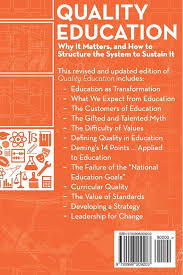The Importance of Quality Education
Education is often described as the key to success and a better future. However, not all education is created equal. Quality education plays a crucial role in shaping individuals, societies, and the world at large.
What is Quality Education?
Quality education goes beyond mere academic achievement. It encompasses a holistic approach to learning that nurtures critical thinking, creativity, problem-solving skills, and emotional intelligence. A quality education equips individuals with the knowledge and skills necessary to navigate an ever-changing world.
The Benefits of Quality Education
Empowerment: Quality education empowers individuals to make informed decisions, pursue their passions, and contribute meaningfully to society.
Economic Growth: Nations that prioritize quality education experience economic growth and development as educated citizens drive innovation and productivity.
Social Cohesion: Quality education fosters understanding, tolerance, and respect among diverse communities, leading to social cohesion and harmony.
Lifelong Learning: A quality education instills a love for learning that extends beyond formal schooling, encouraging lifelong personal and professional development.
Challenges in Achieving Quality Education
Despite its importance, quality education remains out of reach for many due to various challenges such as inadequate funding, lack of trained teachers, unequal access based on socio-economic status or geographic location, and outdated curricula that do not meet the needs of a rapidly changing world.
The Role of Stakeholders in Promoting Quality Education
Governments, educators, parents, communities, and international organizations all play a vital role in promoting quality education. By investing in teacher training, updating educational policies, providing equitable access to resources, fostering partnerships with local communities, and embracing innovative teaching methods, stakeholders can work together to ensure that every individual receives a quality education.
In Conclusion
Quality education is not just a privilege; it is a fundamental human right that has the power to transform lives and societies for the better. By prioritizing quality education for all individuals regardless of background or circumstance, we can build a more inclusive, prosperous, and sustainable future for generations to come.
Top 5 Frequently Asked Questions About Quality Education
- What is quality education and why is it important?
- How can we measure the quality of education?
- What are the challenges to providing quality education for all?
- What role do teachers play in delivering quality education?
- How can stakeholders collaborate to improve the quality of education?
What is quality education and why is it important?
Quality education is more than just acquiring knowledge; it is about fostering critical thinking, creativity, and problem-solving skills that empower individuals to navigate the complexities of the modern world. Quality education goes beyond academic achievement to promote personal growth, social cohesion, and economic development. It is important because it equips individuals with the necessary tools to make informed decisions, contribute meaningfully to society, and drive innovation and progress. Quality education not only benefits individuals by enhancing their opportunities for success but also strengthens communities and nations by promoting equality, tolerance, and lifelong learning. By investing in quality education, we invest in a brighter future for all.
How can we measure the quality of education?
Measuring the quality of education is a complex and multi-faceted task that involves assessing various aspects of the teaching and learning process. One common approach to measuring educational quality is through standardized tests and assessments that evaluate students’ academic performance. However, quality education goes beyond test scores and includes factors such as student engagement, critical thinking skills, creativity, problem-solving abilities, and social-emotional development. Other indicators of educational quality may include teacher qualifications, curriculum relevance, school resources, classroom environment, parent involvement, and post-graduation outcomes. By considering a combination of quantitative data, qualitative observations, feedback from stakeholders, and holistic assessments, we can gain a more comprehensive understanding of the quality of education being provided.
What are the challenges to providing quality education for all?
Providing quality education for all faces a myriad of challenges that hinder its universal accessibility and effectiveness. Some of the key obstacles include inadequate funding for educational resources and infrastructure, a shortage of qualified teachers and staff, disparities in access to education based on socio-economic status or geographic location, outdated curricula that do not align with the needs of a rapidly evolving world, and barriers to inclusive education for marginalized groups such as individuals with disabilities or those from minority backgrounds. Addressing these challenges requires a concerted effort from governments, educators, communities, and stakeholders to prioritize investment in education, promote equal opportunities for all learners, enhance teacher training programs, update educational policies to reflect current realities, and foster partnerships that support the holistic development of every individual.
What role do teachers play in delivering quality education?
Teachers play a pivotal role in delivering quality education as they are not only educators but also mentors, facilitators, and inspirers. Teachers have the power to create a nurturing and stimulating learning environment, tailor their teaching methods to meet the diverse needs of students, provide individualized support, and instill a love for learning. Their dedication, expertise, passion for teaching, and ability to cultivate critical thinking skills and creativity in students are essential components of quality education. Teachers serve as role models who guide and empower students to reach their full potential academically, emotionally, and socially.
How can stakeholders collaborate to improve the quality of education?
Stakeholders can collaborate in various ways to enhance the quality of education. Governments can allocate sufficient funding to support educational initiatives, improve infrastructure, and provide professional development opportunities for teachers. Educators can engage in continuous learning, implement innovative teaching methods, and tailor instruction to meet the diverse needs of students. Parents and communities can actively participate in school activities, support student learning at home, and advocate for inclusive and equitable education policies. By fostering strong partnerships among stakeholders, sharing best practices, and aligning efforts towards a common goal of enhancing educational quality, significant improvements can be made in the overall education system.

